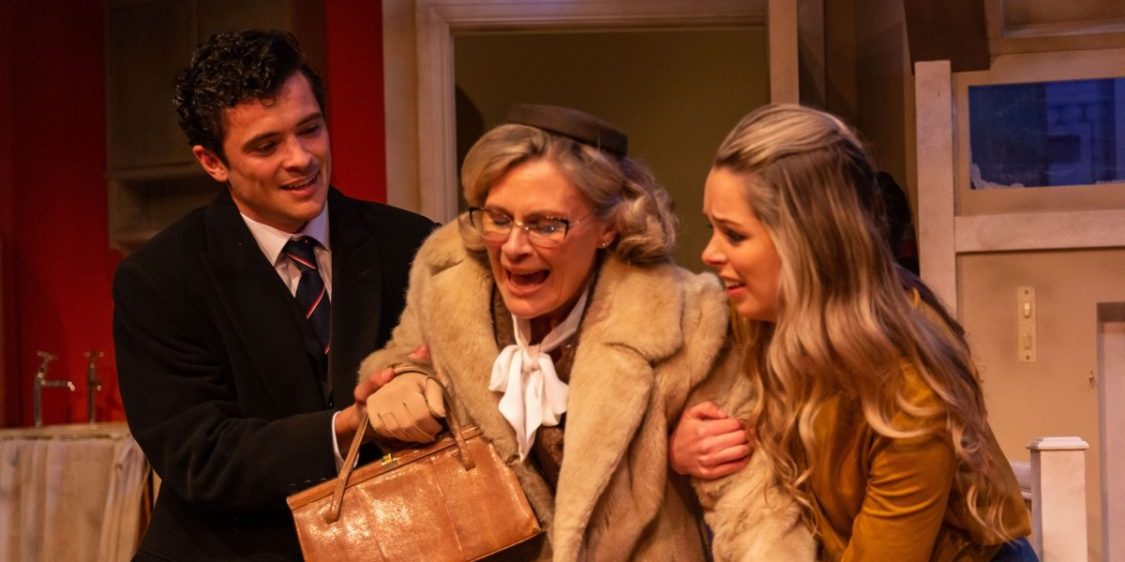As many readers of this website will know, the Mill at Sonning is a wholly delightful theatre venue. When you are perched in a converted mill over a branch of the Thames on a summer evening, with dragonflies skimming the water and the waterwheel lazily turning, it is hard to imagine that London is only a short train-and-taxi ride away. The theatre had a rough ride during Covid, but it is a testament to the affection and admiration in which its creative team are held that local donors and government funding have seen it through to the other side intact. Moreover, the combination of a two-course dinner and ticket still remains excellently combined value for money.
Currently, the theatre is reviving Neil Simon’s classic 1960s comedy ‘Barefoot in the Park’, usually remembered now in the film version starring Robert Redford and Jane Fonda. In the theatre, it has a surprisingly short running-time, and could in fact dispense with an interval altogether, which might benefit the comedy momentum. It is set in a Manhattan apartment, up six flights of stairs, with no heating or telephone, and a broken skylight, all features used as the source of plenty of comic gags. Into this apartment move a newly married couple, Paul and Corrie Bratter, and the action explore not just the hazards of setting up a new home, but the perils of finding out that they may not be as domestically compatible as the preceding honeymoon might have suggested. To complicate and variegate the action and characters, there are prominent supporting roles for Corrie’s mother and an exotic pratfall-prone neighbour from upstairs, and a smaller part for a world-weary telephone engineer.
The production values are as tight and disciplined as ever in this theatre with a lovely set (built on-site as usual) by Michael Holt, which gets the shabby-chic balance just right. There are plenty of levels for the cast to explore in dynamic movement and Robin Herford’s direction ensures a pacy delivery, but with enough pauses to suggest, as you have to with this writer, that the events could quickly turn quite negative and nasty even though they ultimately do not.
The cast is well into the groove now with the production, clearly enjoying riffing off one another and delivering rich characterisations overall. In the early stages at least much of the initiative lies with Corrie, the daffy ingenue: Hannah Pauley finds exactly the right balance between enthusiastic naivete and insecurity to register her quicksilver mood changes and love of experimental life. Jonny Labey has, in one sense, a more difficult role as the slow-burn husband – initially full of starchy, up-tight insistence on conformity but suggesting enough passion underneath, so that when it does burst through it manages to be both a shock and unsurprising.
There is a beautifully judged performance from Rachel Fielding as Corrie’s interfering but well-meaning mother who then goes on to develop a passion of her own. It would be easy just to play this role for the broadest of laughs, but Fielding goes deeper and by revealing further layers actually triggers greater humour. She is well-matched by James Simmons as the mysterious neighbour, Mr Velasco. He has excellent comic timing especially in the scene following the group’s ill-fated night on Staten Island. Oliver Stanley’s telephone engineer brings a stock role to vivid life with the right measures of drollery and innuendo.
Alongside all these fine qualities it does, however, have to be said that the play has not aged well. In a Western world where almost all couples live together before marriage, the basic premise of this play and the humour that flows from it is implausible; and the clash between 60s cultural experiment and traditional values must have struck audiences so powerfully when first performed seems dated, trite and uncompelling now. This means that the audience remains unengaged, looking in on a charming historical curiosity rather than being involved in the action despite the best efforts of the actors.
So while this is never less than an enjoyable night out and a highly professional production it does not really compare with, for example, this theatre’s previous productions of Coward or of classic musicals, both of which still preserve admirable edgy fizz sufficient to captivate a modern audience.

